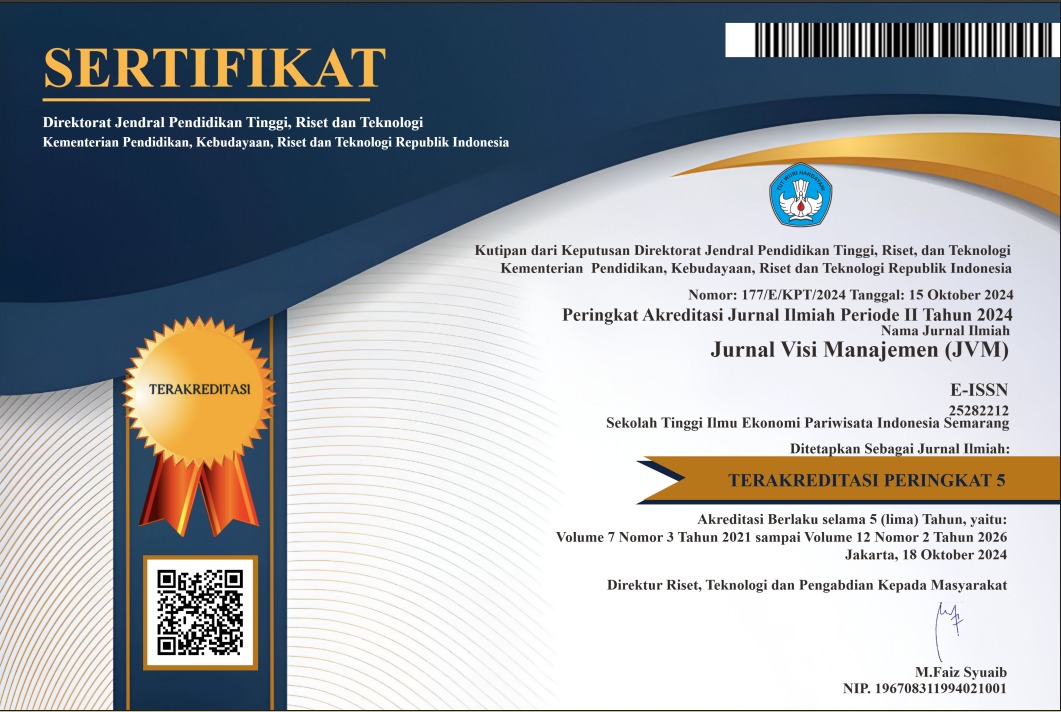Pengaruh Budaya Kerja Islami dan Beban Kerja terhadap Kepuasan dan Kinerja Karyawan pada Rumah Sakit Islami Kendal
DOI:
https://doi.org/10.56910/jvm.v11i3.738Keywords:
Employee Performance, Islamic Work Culture, Job Satisfaction, Kendal Islamic Hospital, WorkloadAbstract
This analysis aims to evaluate the influence of Islamic Work Ethic and Task Load Level on Employee Productivity and Job Satisfaction at Kendal Islamic Hospital. Islamic Work Ethic in this study is measured through five main dimensions, namely siddiq (integrity), istiqamah (steadfastness), fathanah (intellectual intelligence), amanah (reliability), and tabligh (communication capacity). Meanwhile, Task Load Level is understood as work pressure reflected by three main indicators, namely physical fatigue, emotional fatigue, and psychological fatigue. This study uses a quantitative approach with an explanatory research design to test the causal relationship between variables. Primary data were collected through the distribution of structured questionnaires to hospital employees using probability sampling techniques, so that respondent representation is more assured. Data analysis was carried out using multiple linear regression through SPSS software, to determine the level of direct and indirect influence between variables. The results of the study indicate that Islamic Work Ethic has a positive and significant influence on Employee Job Satisfaction and Productivity, indicating that the application of Islamic values in work ethic can encourage motivation, loyalty, and performance. Conversely, the Level of Task Load has a significant negative effect on Job Satisfaction, indicating that excessive workload can reduce satisfaction, although it is not proven to have a significant impact on Employee Productivity. Furthermore, Job Satisfaction is proven to have a positive and significant influence on Employee Productivity, so it can play a role as an important mediating variable in the relationship between work ethic and performance. This study provides a theoretical contribution to the development of human resource management concepts based on Islamic values, while also offering practical recommendations for hospital managers to strengthen Islamic work ethic and manage workload proportionally to improve employee welfare and performance.
References
Abdul Rahman, H., Abdul Aziz, A., Ibrahim, M. A., Suhaili, N.-A., Daud, A. Z., & Naing, L. (2021). Implications of Islamic governance towards psychosocial work stressors and work productivity. Journal of religion and health, 60(2), 804–815.
Adhikara, A., Rahmawati, W., & Musaida, M. (2022). Work Culture, Workload, and Job Satisfaction Intervening a Public Hospital Nurses Performance. Interdisciplinary Social Studies, 1(11). https://doi.org/10.55324/iss.v1i11.274
Ahmad, A., Alam, H. V., Mendo, A. Y., & Asi, L. L. (2024). Pengaruh Beban Kerja Terhadap Kinerja Karyawan Pada PT. Sinar Niaga Sejahtera Kabupaten Gorontalo. JAMBURA: Jurnal Ilmiah Manajemen dan Bisnis, 7(1), 12–20. https://ejurnal.ung.ac.id/index.php/JIMB/article/view/25041
Alam, M. N., Erwin, E., Hamida, H., & Sukran, S. (2023). The Influence of Islamic Work Ethics on Organizational Commitment and Performance of Halal Restaurant Employees. Jurnal Ekonomi Kuantitatif Terapan, 16(1), 97. https://doi.org/10.24843/JEKT.2023.v16.i01.p06
Ali, A. J., & Al Owaihan, A. (2023). Islamic work ethic: a critical review. Cross cultural management: An international Journal, 15(1), 5–19.
Amaliasita, M., & Astuti, R. J. (2023). Islamic work ethic and employee performance: The role of job satisfaction as a mediator. IJIBE (International Journal of Islamic Business Ethics), 8(2), 83–93. https://jurnal.unissula.ac.id/index.php/ijibe/article/view/23436
Anitha, J. (2014). Determinants of employee engagement and their impact on employee performance. International journal of productivity and performance management, 63(3), 308–323. https://doi.org/10.1108/IJPPM-01-2013-0008
Astuti, S. D., Shodikin, A., & Ud-Din, M. (2020). Islamic leadership, Islamic work culture, and employee performance: The mediating role of work motivation and job satisfaction. The Journal of Asian Finance, Economics and Business, 7(11), 1059–1068. https://doi.org/10.13106/jafeb.2020.vol7.no11.1059%0D
Atatsi, E. A., Stoffers, J., & Kil, A. (2019). Factors affecting employee performance: a systematic literature review. Journal of Advances in Management Research, 16(3), 329–351. https://www.emerald.com/insight/content/doi/10.1108/JAMR-06-2018-0052/full/html
Bahmani Oskooee, M., & Wooton, I. (t. t. ). (2023). Medical Research, Nursing, Health and Midwife Participation THE INFLUENCE OF ORGANIZATIONAL CULTURE ON EMPLOYEE PERFORMANCE WITH COMPENSATION AS AN INTERVENING VARIABLE (Case Study on Employees of the Residential Area Housing Office And Cleanliness of the. https://medalionjournal.com/
Bunyamin, A. (2021). Komitmen Kerja, Budaya Kerja Islami, dan Kepuasan Kerja sebagai Faktor Determinan Organizational Citizenship Behavior. JURNAL IDAARAH, 5(2), 160–175. https://scholar.archive.org/work/mskcxz54ovehhjzkx5ith3mw54/access/wayback/http://journal.uin-alauddin.ac.id/index.php/idaarah/article/download/21874/pdf
Diana, Y., & Si, M. (2019). No Title. 193–205.
Fajriani, A., & Septiari, D. (2015). Pengaruh beban pekerjaan terhadap kinerja karyawan: Efek mediasi burnout. Jurnal Akuntansi, Ekonomi dan Manajemen Bisnis, 3(1), 74–79.
Fang. H. (2024). Investigating the Effects of Motivation and Job Satisfaction on Performance among Telecommunications Employees. Journal of Digitainability, Realism & Mastery (DREAM), 122–140. https://doi.org/10.56982/dream.v3i10.271
FARID, M. F. (2022). PENGARUH ISLAMIC CORPORATE CULTURE, TRANSFORMATIONAL LEADERSHIP, PERSONALITY DAN JOB SATISFACTION TERHADAP EMPLOYEE ENGAGEMENT BANK SYARIAH XYZ. UNIVERSITAS NEGERI JAKARTA.
Hamjah, R. S., Sutisna, E., & Faisal, M. G. (2024). Pengaruh Disiplin Kerja dan Kepuasan Kerja terhadap Kinerja Karyawan pada Badan Kesbangpol Kota Tangerang. AKADEMIK: Jurnal Mahasiswa Humanis, 4(3), 763–771. https://www.ojs.pseb.or.id/index.php/jmh/article/view/1015
Jerald, G., & Baron, R. A. (2000). Behaviour in Organisations. Prentice-Hall Incorporated.
King, D. D., Newman, A., & Luthans, F. (2016). Not if, but when we need resilience in the workplace. Journal of organizational behavior, 37(5), 782–786. https://onlinelibrary.wiley.com/doi/abs/10.1002/job.2063
Kristanti, D., Charviandi, A., Juliawati, P., & Harto, B. (2023). Manajemen Sumber Daya Manusia Manajemen Sumber Daya Manusia. In Edisi Revisi Jakarta: Bumi Aksara (Libk. 1, Zenbakia 1). https://books.google.com/books?hl=en&lr=&id=e2ppEAAAQBAJ&oi=fnd&pg=%0APA1&dq=manajemen+pengetahuan&ots=gV368HYlR3&sig=ugm1Twmqr6Ya9ITLRHYA6ieJi0%0D
Kuruppu, C. L., Pathirana, G. Y., & Rodrigo, J. A. H. (2022). The impact of job satisfaction on employee performance: A case at ABC manufacturing company.
Latif, H., & Sahraman, D. (2021). Knowledge and attitudes towards Islamic banking in the Philippines. Journal of Islamic Accounting and Business Research, 12(2), 169–185. https://www.emerald.com/jiabr/article/12/2/169/214488
Locke, E. A. (1995). The micro-analysis of job satisfaction: Comments on Taber and Alliger. Journal of Organizational Behavior, 123–125.
Mohammad, J., Quoquab, F., Idris, F., Al-Jabari, M., Hussin, N., & Wishah, R. (2018). The relationship between Islamic work ethic and workplace outcome: A partial least squares approach. Personnel Review, 47(7), 1286–1308. https://www.emerald.com/insight/content/doi/10.1108/pr-05-2017-0138/full/html
Muhammad Irfan, N. (2017). Pengaruh Stres Kerja, Kepuasan Kerja Dan Komitmen Organisasi Terhadap Turnover Intention Medical Representative. J. Jurnal Ilmiah Manajemen, 407–426.
Murphy, K. R. (2017). Reflections on the Journal of Applied Psychology for 1997 to 2002. Journal of Applied Psychology, 102(3), 569. https://doi.org/10.1037/apl0000054%0D
Notoatmodjo, H., & Rakhmawatie, M. D. (2012). Faktor-Faktor Yang Berhubungan Dengan Kejadian Asfiksia Neonatorum. Jurnal Kedokteran Muhammadiyah, 1(2).
Oriana, D., & Violita, E. S. (2020). The Effect of Islamic Work Ethics on Job Satisfaction, Organizational Commitment, Turnover Intention, and Innovation Capability. ICO-ASCNITY 2019: Proceedings of the 1st International Conference on Applied Social Sciences, Business, and Humanity, ICo-ASCNITY, 2 November 2019, Padang, West Sumatra, Indonesia, 361.
Rahmi, Y. (2016). Budaya Kerja Islami Guru-Guru SDN Kota Solok dalam Meningkatkan Mutu Hasil Belajar. al-fikrah: Jurnal Manajemen Pendidikan, 2(2), 187–200.
Ratmawati Ratmawati, Edy Suwasono, & H. S. (2023). Pengaruh Kepuasan Kerja Dan Stres Kerja Terhadap Komitmen Organisasi Pada Karyawan UKM 103 Mendunia Centre Kediri. Jurnal Riset Manajemen Dan Ekonomi (Jrime),.
Ratnaningrum, R., Suci Rahmadani, W., Andika Kusumajaya, R., Zusrony, E., Nur Hidayat, E., Friedman, H. H., Krausz, J., Lavric, A.-L., Gologan, E., Nicolae Gologan, A., Krysta Grumeza, M., Stefan Gologan, D., Emmanuela Gilca Blanariu, G., Olteanu, A., & T. (2024). The Influence of Religion and Spirituality on Health. Journal of Intercultural Management and Ethics Issue, 2.
Ridwansyah, R., Fauzan, R., Hendri, M. I., Kalis, M. C. L., & Rosnani, T. (2023). The Relationship of Islamic Work Ethic to Work Culture Through Innovative Work Behavior of Madrasah Teachers. International Journal of Social Sciences and Humanities, 7(1), 88–97.
Robbins, S. P., & J. T. J. T. (2017). Organizational Behavior. Pearson. .
Rohman, M. A., & Ichsan, R. M. (2021). Pengaruh Beban Kerja Dan Stres Kerja Terhadap Kinerja Karyawan Pt Honda Daya Anugrah Mandiri Cabang Sukabumi Malik. Jurnal Mahasiswa Manajemen, 2(1), 1851–2798.
Rolos, J. K. R., Sambul, S. A. P., & Rumawas, W. (2018). Pengaruh beban kerja terhadap kinerja karyawan pada PT. Asuransi Jiwasraya Cabang Manado Kota. Jurnal Administrasi BisniS (JAB), 6(004), 19–27. https://ejournal.unsrat.ac.id/index.php/jab/article/view/21074
Sunuharjo, B., & Ruhana, I. (2016). Pengaruh kepuasan kerja dan komitmen organisasional terhadap kinerja karyawan (studi pada PT. Telekomunikasi Indonesia, Tbk Witel Jatim Selatan, Malang. J. Adm. Bisnis S1 Univ. Brawijaya. http://download.garuda.kemdikbud.go.id/article.php?article=634777&val=6468&title=PENGARUH KEPUASAN KERJA DAN KOMITMEN ORGANISASIONAL TERHADAP KINERJA KARYAWAN Studi pada PT Telekomunikasi Indonesia Tbk Witel Jatim Selatan Malang
Utomo, S. (2019). Pengaruh beban kerja dan stres kerja terhadap kinerja karyawan pada PT. Mega Auto Central Finance Cabang di Langsa. PARAMETER, 4(2).
Widayati, C., & Triana, R. (2020). Pengaruh kepuasan kerja dan komitmen organisasional terhadap kinerja karyawan. Jurnal Perspektif Manajerial Dan Kewirausahaan (JPMK), 1(1), 15–25.
Wisantyo, N. I. (2015). Pengaruh Stres Kerja, Disiplin Kerja dan Kepuasan Kerja Terhadap Intensi Turnover (Studi pada Lembaga Pengelola Dana Bergulir Koperasi dan Usaha Mikro, kecil dan menengah). Universitas Mercu Buana Jakarta-Menteng.
Wu, W., Rafiq, M., & Chin, T. (2017). Employee well-being and turnover intention: Evidence from a developing country with Muslim culture. Career Development International, 22(7), 797–815.
Yasir, M., & Maulida, N. (2022). Pengaruh Nilai-nilai Islam terhadap Budaya Organisasi. Langgas: Jurnal Studi Pembangunan, 1(1), 26–30.
Zaki, H., & Marzolina, M. (2016). Pengaruh Beban Kerja dan Kompensasi terhadap Turnover Intention melalui Kepuasan Kerja pada Karyawan PT. Adira Quantum Multifinance Cabang Pekanbaru. Jurnal Tepak Manajemen Bisnis, 8(3). https://jtmb.ejournal.unri.ac.id/index.php/JTMB/article/viewFile/5598/5229
Downloads
Published
How to Cite
Issue
Section
License
Copyright (c) 2025 Jurnal Visi Manajemen

This work is licensed under a Creative Commons Attribution-ShareAlike 4.0 International License.







